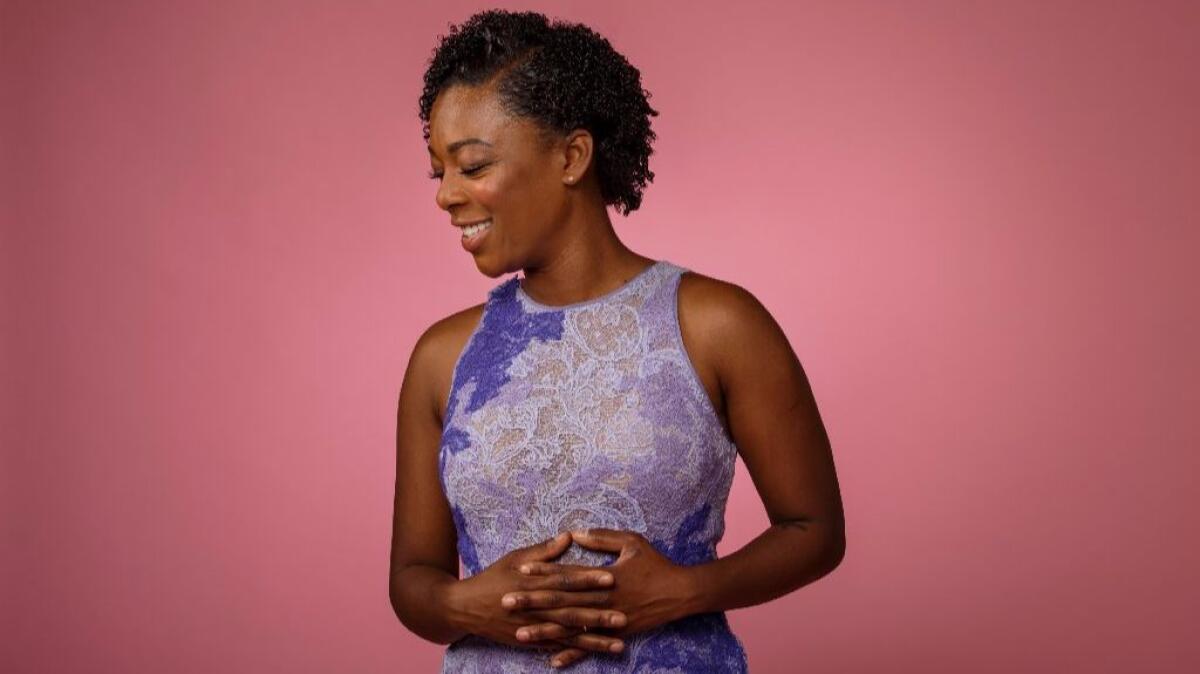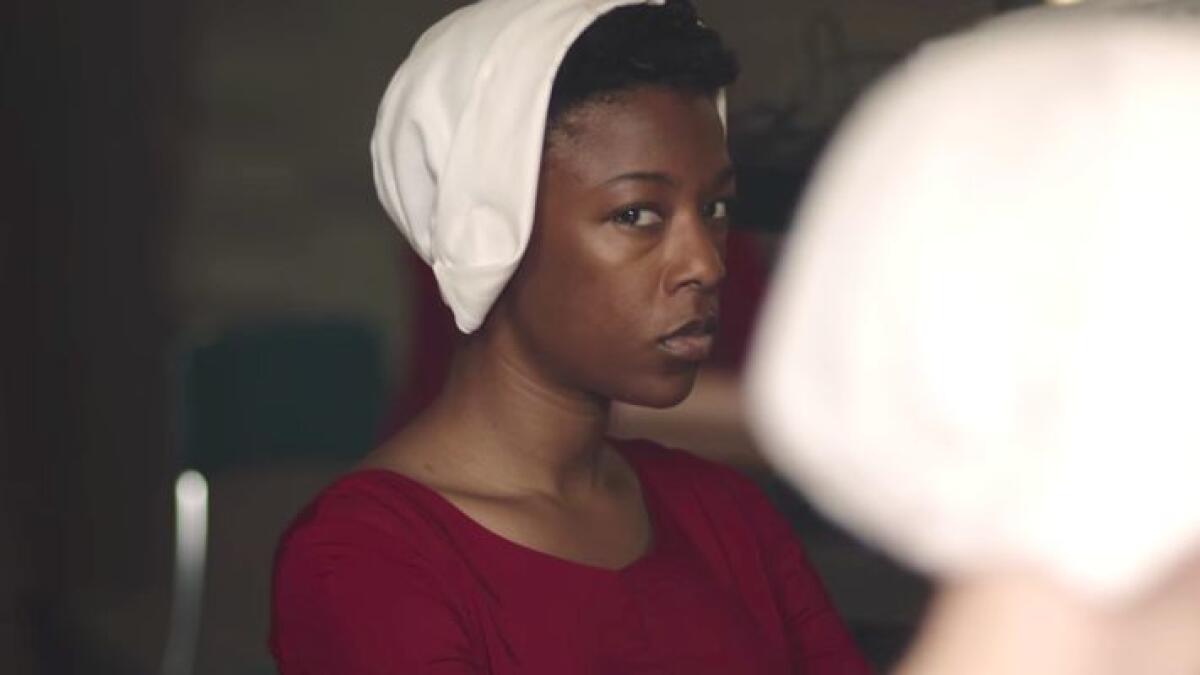Q&A: Samira Wiley talks ‘Orange,’ ‘Handmaid’s Tale’ and doing the electric slide at Disneyland

Samira Wiley still tears up a bit talking about Poussey Washington, the character she played on “Orange Is the New Black” for four seasons.
“She gave me my life,” Wiley says. “She gave me a career. I met my wife [writer Lauren Morelli] on ‘Orange.’ I felt like from the moment I got that role, I was doing what I was supposed to be doing. And now it’s gone — which is fine. I’m on to the next thing.”
Poussey died in a prison riot in Season 4’s penultimate episode, her demise echoing the 2014 chokehold death of Eric Garner at the hands of New York City police officers. Shortly afterward, Wiley won the role of Moira in
Wiley, 30, dropped by The Times’ offices shortly before a recent call time on a movie project, shooting in downtown Los Angeles, that she’s not at liberty to discuss. But she had plenty to say about a host of other topics, including the foreboding finale of “Handmaid’s.”
In the book, Moira’s fate remains ambiguous after Offred finds her at Jezebel’s. When did the producers tell you that you’d be continuing on the show?
For the longest time, I had no idea. You’re right. In the book, you don’t really see her after Jezebel’s. I was almost afraid to ask. On “Orange,” you couldn’t talk to the writers about anything. It was all on lockdown. But here, they gave me more hints. It was bit by bit, piece by piece.
Even then, there’s something pure about reading the script and not knowing what’s going to happen. It feels like watching a show with everyone else. I don’t necessarily want to know what’s going to happen next.
So you weren’t dying inside, wondering, “Am I going to have a job next season?”
I’m a person who likes and wants to live in the moment. It comes easy to me — probably because of my ADD. I can’t focus on too many things at one time.
I mean, I didn’t even read the book until after I was cast, which was interesting because Margaret Atwood happens to be my wife’s favorite author. I had no clue. She freaked out when I got the audition, which was good because I was a little wary of playing another gay character. I didn’t want to be typecast. And she was like, “Absolutely not!”
Being married to a writer is crazy. You have no control. Anything you do or say can end up in a script.
— Samira Wiley
Moira was presumed dead after the fourth episode. People weren’t too happy about that.
So many people were like, “Oh my God, I can’t believe they did this to you twice! They killed Poussey and now you’re dead in ‘The Handmaid’s Tale.’” And I wanted to be like, “No guys! Please don’t stop watching!”
And then finally, Episode 8 came out and you see Moira in that costume at Jezebel’s and everybody was like, “Oh my God! Those bunny ears!” They were pretty intense. We probably could have done with something smaller.
It was great seeing Moira alive, but awful to see what she had become.
She has literally become this other person. I feel like the goal in the last few episodes is for her to come back to herself in the same way Offred has. Moira’s character inspires Offred early on and helps her get through the hard times and then that happens in reverse when they see each other again. Offred tells her, “Don’t let the bastards grind you down.”
And it snaps her out of it. And she finally makes it to Canada.
It’s pretty … fantastic. She got there by accident, but of course it’s not by accident. She tried to get there way earlier than everybody else, as we learn in Luke’s backstory when Offred says, “We should have left when Moira left.”

I wanted a Moira backstory episode. Why’d Luke get one but not Moira?
I know! What the …? Season 2, hello? (Laughs)
You do turn up in “Orange” for a flashback scene this new season.
My wife wrote that episode. That’s how I ended up there. But she also wrote the episode where I died last season.
So she kind of owed you something ...
Being married to a writer is crazy. You have no control. Anything you do or say can end up in a script. That thing in the first season of “Orange” with Piper and Alex where they would say, “I heart you” literally came from something I said to her. Literally. I wasn’t emotionally available to say “I love you” yet. Now it’s an “Orange Is the New Black” thing.
And you originated it!
You want to hear another one? One time, we were having this conversation where she used the word “normalacy.” I told her that wasn’t a word. It’s normalcy. And she fought me on it until she realized, “OK. I’m wrong.” Then she goes and writes, I think in Season 3, a scene where me and Big Cindy are having the same conversation but she makes me the wrong one!
She exacted her revenge.
I’m a real stickler for words. I was so. … Now I’m the one in the episode saying, “I’m pretty sure it’s ‘normalacy.’” [Wiley shakes her head] So stupid.
Do you have any idea what they have planned for Moira next season? Because they’ve already broken from the book ...
We had a screening of the finale and at the panel afterward, the showrunner [Bruce Miller] talked about things we could explore, like Moira and Luke in Canada. They found each other. They’re family now. I don’t know much. But even just to hear those few things made me really excited. Let’s go find [Offred’s daughter] Hannah!
What did you think of the parallels between Gilead and the current climate in America? I’m thinking of that one scene in the coffeehouse where the counter guy calls you and Elisabeth Moss’ character sluts.
Bruce was saying that the election really opened up this thing where people who were thinking these things for years all of a sudden had permission to say them out loud. So he changed some things in the script, thinking, “This can happen because I see it happening.” I wonder if that was one of those things.
I have a friend, my age, who was on the train the day after the election, and this guy was just staring at him the entire ride. You know, someone looks at you a certain way and it makes you cringe. And he said when he got off the train, this guy just looked at him and said, “[N-word]” and walked off the train. And he was like, “How do people already feel like they can say anything to us?”
The show really captures the sense that encroaching ugliness in the pre-Gilead scenes, that maybe we shouldn’t assume progress is a given. Maybe we’re going backward ...
Yes. And people really want to talk to me about all that kind of stuff. I went to the “Cars 3” premiere at Disneyland the other day and I’m dancing and drinking a beer and
Then Lea goes, “She’s also in ‘Handmaid’s Tale.’” He immediately stops and says, “What? Wait.” And he brings me over and he had all these questions.
I’m still thinking about the part where you said you were drinking a beer in Disneyland.
I know, right? I was doing the electric slide with a beer in my hand. It was awesome.
From the Oscars to the Emmys.
Get the Envelope newsletter for exclusive awards season coverage, behind-the-scenes stories from the Envelope podcast and columnist Glenn Whipp’s must-read analysis.
You may occasionally receive promotional content from the Los Angeles Times.





